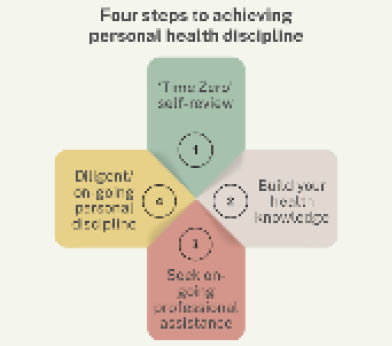We have so far covered the broad determinants of our health. Today we will begin to take up what we need to do and be doing to ensure that we enhance our chances of being in the best health condition possible at all times. I would suggest that this has four stages as follows:
Step 1: Make a ‘time zero’ self-review
Step 2: Build your health knowledge
Step 3: Seek professional assistance (first time, ongoing)
Step 4: Personal discipline
‘Time Zero’ self-review is a personal assessment of everything about us that may have a bearing on our health right now: Our age (it is not ‘just’ a number); Do we have some underlying health matters (is it under management or not); Are there any family medical history of concern; Any unhealthy behaviours; Our careers and work routine; The state of our finances; The state of our various relationships: Are there any issues bothering us; etc.
Being consciously aware of these matters involves a little soul-searching requiring that we are honest with ourselves. It may also require asking others such as family elders about common health concerns that run in the family that we may not be aware of. This exercise will help us when we get to the stage of meeting our health professional for any first examinations (assuming we have not been regular at them) as they will need as much relevant information as might help them to zero in on what to begin to look at in greater detail.
Build your health knowledge: Our body is an amazing machine with intricately linked and interdependent parts ceaselessly working together. On one hand, it is highly resilient with a capacity to clean, protect, grow and renew itself. On the other, it is so vulnerable that ‘just’ 10mg of the wrong substance in it can shut it down and lead to the death of an otherwise healthy adult human.
Educating ourselves about health matters is the second step we need to take towards improving our chances of living healthy lives. This would include reading about the basics of what determines our health and asking professionals about the general medical issues of concern in our times and environment and those that may be specific to us. Some health alerts may be particular to our gender, age, profession, etc. A few of the matters we need to be aware of include the following:
Blood pressure, ‘BP’: In a highly synchronised fashion, our hearts are constantly taking in oxygen-deficient/waste-rich blood from our organs and tissues (as well as oxygen- and nutrient-rich blood from our lungs) and pumping out the former to the lungs and the latter all around the body through sixty thousand miles of blood vessels within a minute! BP is a measure of the force per unit area at which the heart pumps out the blood through the arteries. Some of the factors that may determine or influence our BP include our genes, age, sleep routine, body build, exercise regimen, emotional state, diet, medications, etc.
BP is measured at the points the heart ventricles contract (the systole) and when the ventricles relax (the diastole). A systolic and diastolic pressures of 120mm and 80mm of mercury respectively, expressed as 120/80mm Hg in an adult would be considered normal. Higher and persistent readings that are not managed could cause kidney disease, stroke, etc. BP is one of the first measures that health professionals would always take as they begin most medical examinations. With understanding and the right equipment, we could also take our BP readings in the comfort of our living rooms.
Cholesterol is a waxy fat-like substance that helps our body’s metabolic processes, in the making of cell membranes, the production of bile, hormones, vitamin D, etc. The cholesterol in our blood comes essentially from our liver and some of the foods we eat. Normally, our bodies can rid itself of excess cholesterol, but the system may not always work for any of various possible reasons. The uncontrolled build-up of cholesterol beyond a range can obstruct and/or entirely prevent blood flow to vital organs increasing risks of cardiovascular disease, stroke or death. Consequently, monitoring the levels of cholesterol in our blood is crucial. Our first line of ‘defence’ is to watch what we eat on an ongoing basis, avoid smoking, and take regular physical exercises. Tests should be taken periodically or as may be directed by a health professional to measure total cholesterol, HDL, LDL, and triglycerides. If required, your doctor may prescribe medications to take care of any excess cholesterol in your blood. Controllable and uncontrollable risk factors for high cholesterol include genes, age, smoking, sedentary lifestyle, unhealthy diet, etc.
Body-Mass Index, BMI, is a measure of the extent to which we may be under-, normal, or overweight given our height. The higher the BMI, the higher the ordinary risk of breathing and musculoskeletal problems, high blood pressure, cardiovascular disease, type 2 diabetes, etc. On the other hand, being underweight can result in health issues like risks of malnutrition, osteoporosis and anaemia. Whilst there are some reservations about the ‘universality’ of the BMI (because it doesn’t take such factors as muscle mass into consideration), it, nonetheless, gives us some idea of risk factors there might be. You can calculate your BMI as BMI=W/H^2; where W is your weight in kilograms and H is your height in metres, and check it against established charts ensuring that you use the right units.
Other medical issues to be aware of and regularly check out for will include the state of our eyes, sugar levels, liver function, kidney function, and cancer (breast, prostate, colon, etc.).
Next week we will take up the last two stages of health management.

 Join Daily Trust WhatsApp Community For Quick Access To News and Happenings Around You.
Join Daily Trust WhatsApp Community For Quick Access To News and Happenings Around You.

